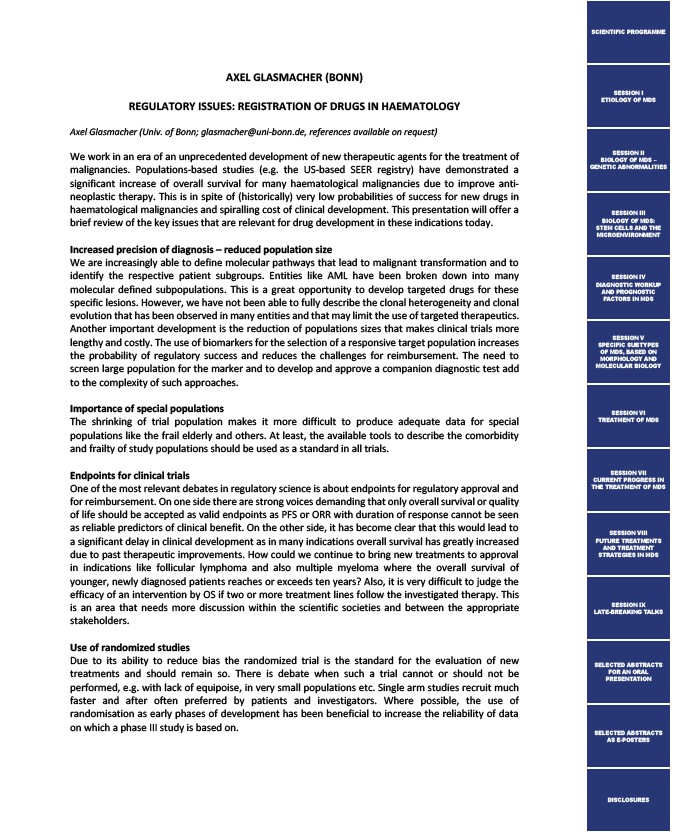
AXEL GLASMACHER (BONN)
REGULATORY ISSUES: REGISTRATION OF DRUGS IN HAEMATOLOGY
Axel Glasmacher (Univ. of Bonn; glasmacher@uni-bonn.de, references available on request)
We work in an era of an unprecedented development of new therapeutic agents for the treatment of
malignancies. Populations-based studies (e.g. the US-based SEER registry) have demonstrated a
significant increase of overall survival for many haematological malignancies due to improve anti-neoplastic
therapy. This is in spite of (historically) very low probabilities of success for new drugs in
haematological malignancies and spiralling cost of clinical development. This presentation will offer a
brief review of the key issues that are relevant for drug development in these indications today.
Increased precision of diagnosis – reduced population size
We are increasingly able to define molecular pathways that lead to malignant transformation and to
identify the respective patient subgroups. Entities like AML have been broken down into many
molecular defined subpopulations. This is a great opportunity to develop targeted drugs for these
specific lesions. However, we have not been able to fully describe the clonal heterogeneity and clonal
evolution that has been observed in many entities and that may limit the use of targeted therapeutics.
Another important development is the reduction of populations sizes that makes clinical trials more
lengthy and costly. The use of biomarkers for the selection of a responsive target population increases
the probability of regulatory success and reduces the challenges for reimbursement. The need to
screen large population for the marker and to develop and approve a companion diagnostic test add
to the complexity of such approaches.
Importance of special populations
The shrinking of trial population makes it more difficult to produce adequate data for special
populations like the frail elderly and others. At least, the available tools to describe the comorbidity
and frailty of study populations should be used as a standard in all trials.
Endpoints for clinical trials
One of the most relevant debates in regulatory science is about endpoints for regulatory approval and
for reimbursement. On one side there are strong voices demanding that only overall survival or quality
of life should be accepted as valid endpoints as PFS or ORR with duration of response cannot be seen
as reliable predictors of clinical benefit. On the other side, it has become clear that this would lead to
a significant delay in clinical development as in many indications overall survival has greatly increased
due to past therapeutic improvements. How could we continue to bring new treatments to approval
in indications like follicular lymphoma and also multiple myeloma where the overall survival of
younger, newly diagnosed patients reaches or exceeds ten years? Also, it is very difficult to judge the
efficacy of an intervention by OS if two or more treatment lines follow the investigated therapy. This
is an area that needs more discussion within the scientific societies and between the appropriate
stakeholders.
Use of randomized studies
Due to its ability to reduce bias the randomized trial is the standard for the evaluation of new
treatments and should remain so. There is debate when such a trial cannot or should not be
performed, e.g. with lack of equipoise, in very small populations etc. Single arm studies recruit much
faster and after often preferred by patients and investigators. Where possible, the use of
randomisation as early phases of development has been beneficial to increase the reliability of data
on which a phase III study is based on.
SCIENTIFIC PROGRAMME
SESSION I
ETIOLOGY OF MDS
SESSION II
BIOLOGY OF MDS –
GENETIC ABNORMALITIES
SESSION III
BIOLOGY OF MDS:
STEM CELLS AND THE
MICROENVIRONMENT
SESSION IV
DIAGNOSTIC WORKUP
AND PROGNOSTIC
FACTORS IN MDS
SESSION V
SPECIFIC SUBTYPES
OF MDS, BASED ON
MORPHOLOGY AND
MOLECULAR BIOLOGY
SESSION VI
TREATMENT OF MDS
SESSION VII
CURRENT PROGRESS IN
THE TREATMENT OF MDS
SESSION VIII
FUTURE TREATMENTS
AND TREATMENT
STRATEGIES IN MDS
SESSION IX
LATE-BREAKING TALKS
SELECTED ABSTRACTS
FOR AN ORAL
PRESENTATION
SELECTED ABSTRACTS
AS E-POSTERS
DISCLOSURES